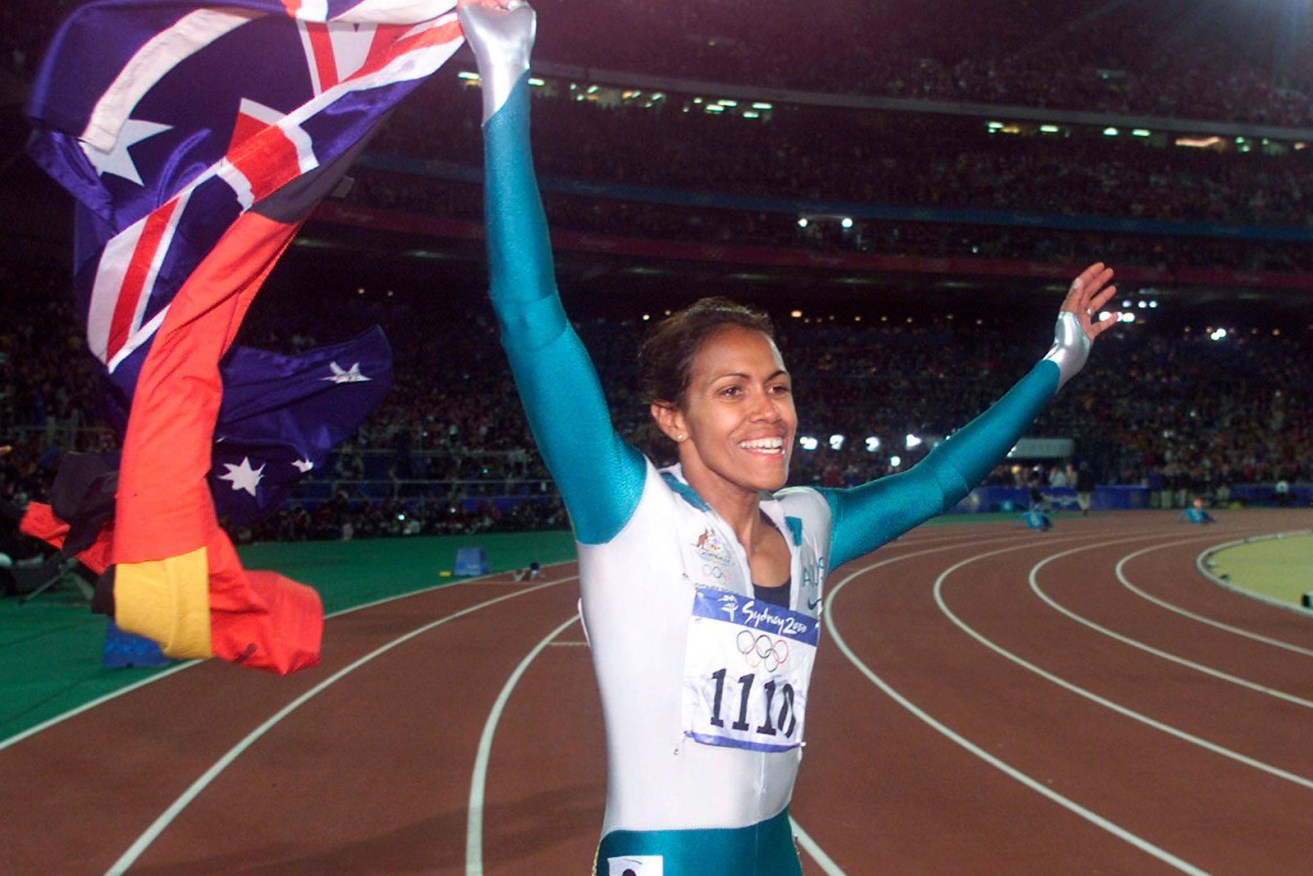Never mind the Oxford Scholars – smart money says SEQ Olympics worth every penny
Lessons learnt from the cost blowouts of past Olympics will help ensure that under the New Norms, a Games in southeast Queensland would be a huge economic boost for our region, writes Scott Smith

Cathy Freeman celebrates her Sydney 2000 Olympics 400m gold medal (photo: SBS)
Since 2015, the Council of Mayors (SEQ) has been investigating the potential of an Olympic and Paralympic Games in southeast Queensland. In particular, we questioned whether a Games would attract the transport investment needed to support the anticipated growth of our region.
As we saw with the Gold Coast 2018 Commonwealth Games and the light rail network, the firm deadline of a global event can be a very powerful catalyst for our governments to spring into action.
In the five years the Council of Mayors (SEQ) has been on this journey, we’ve also had many questions about whether the costs of hosting the Olympic Games would outweigh the benefits.
This week, as we celebrate the 20th anniversary of the Sydney 2000 Games, is no different.
Oxford University has released its latest analysis of the historic costs of every Olympic Games from Rome 1960 through to Rio 2016. You don’t need to be an economist to work out that there have been some doozies in that mix.
And while we’ve seen many takes on how much the Games cost, few have actually looked at the value of hosting the Olympic Games.
For the SEQ Mayors, that’s exactly what we wanted to know. Not what the Sydney 2000 Games cost, but what its value was to New South Wales and all of Australia. Was it worth it?
The resounding answer is “absolutely”. Whether you look at the costs versus benefits or the immeasurable collective national positivity the Games fostered across Australia, it’s a clear yes.
This might seem contrary to the Oxford report. While our costs of the Sydney 2000 Games are similar, the major difference is that we also looked at what that cost delivered in return.
According to that report, the Sydney 2000 Olympic Games cost $6.91 billion to host. However, our research shows that only around $2 billion of that cost came from public funds.
That $6.91 billion also included the transport infrastructure delivered in the lead up to the Sydney Games – roads, bridges, pedestrian walkways, a ferry wharf, the Homebush Bay rail line and Olympic Park Station – whether it was Games-specific or not.
In return, the 2000 Games delivered an estimated $22 billion in economic uplift to New South Wales and Australia that came in the form of increased tourism and visitor expenditure, attraction of international business, and exposure to a global audience of almost 4 billion people.
The delivery of the infrastructure alone created more than 100,000 jobs in the lead up to the 2000 Games.
By the report’s own admission, it does not measure the economic return of these infrastructure legacies.
Sydney Olympic Park is the most tangible legacy left behind by the 2000 Games which, prior to COVID-19, was generating around $1 billion in economic activity annually.
Understandably, economists shy away from trying to assess the costs versus the benefits of the Olympic Games because it is incredibly difficult to do. The impact of an Olympic Games on the host nation is far-reaching and touches almost every part of society as we know it.
The report has however raised some important ways to reduce Olympic Games costs and the risk of budget blow outs.
The southeast Queensland proposal is already addressing many of these through the IOC’s New Norm reforms, a suite of 118 reforms aimed at changing the way an Olympic Games is hosted.
Specifically, the New Norm reforms allow hosts to reuse existing venues and facilities to reduce capital costs. A Games bid can also encompass an entire region or country, rather than just a city, to spread the physical burden of hosting the world’s biggest event.
The Oxford report suggests that the IOC should also invest more into hosting the Games. For the 2032 Games, the IOC has already committed to increasing its financial contribution to at least $2.5 billion (AUD).
The IOC’s New Norm reforms address the challenge of the External Beginner Syndrome, where every host starts from scratch with limited expertise or experience thus increasing the risk of error or overruns.
To counter this, the IOC now funds the sharing of information and a team of consultants to foster greater knowledge and experience of event delivery for potential hosts.
For southeast Queensland, our team of experts were formed out of the delivery of Sydney 2000 and come with hands-on experience and first-hand knowledge of the challenges of hosting an Olympic Games.
While currently on hold as the nation addresses the immediate impacts of the COVID-19 pandemic, the south-east’s proposal to secure the 2032 Games could be Queensland’s greatest weapon in reigniting the economy and its struggling tourism sector in the coming decade.
As other nations realise the new economic potential of the Olympic Games, the race for 2032 is heating up. Germany, Spain, Indonesia, Korea, India and most recently Qatar have all put their hands up.
Economists will no doubt continue to analyse the past costs of the Olympic Games. For the Council of Mayors (SEQ), we remain focused on investigating what a 2032 Games could do for the future of the south-east and Queensland.
Scott Smith is Chief Executive Officer of the SEQ Council of Mayors












